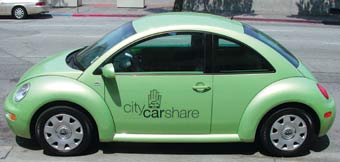San Francisco City CarShare: Longer-Term Travel-Demand and Car Ownership Impacts

Written May, 2006
The fourth year analysis of the impacts of carsharing in the Bay Area. This is the result of my work as a graduate student researcher under Robert Cervero at UC Berkeley while working on my Master's in City Planning. Written with Aaron Golub and Robert Cervero.
Official Description:
This is the fourth of a series of studies on the impacts of San Francisco’s pioneering City CarShare program on travel behavior and car ownership patterns, conducted through the Institute of Urban and Regional Development at UC Berkeley. While early analyses suggested car-sharing stimulated motorized travel, after two years into the program, these impacts had been tempered. In part, because some City CarShare members had reduced car ownership levels, net reductions in vehicle miles traveled were found by the program’s second anniversary. This report examines the longer term impacts of the City CarShare program on travel demand and car ownership. It complements the previous analyses that focused on short and intermediate-term impacts. It gives particular focus to the question of whether the travel reduction evidence uncovered two years into the City CarShare program were sustained or gained momentum four years after the program's inception, or perhaps were short-lived and reversed course. As in the earlier studies, a matched-pair comparison of travel patterns between members and a statistical control group of non-members is used. Factors that explain CarShare members' travel choices and car-shedding behavior are also modeled. The interested reader is referred to earlier reports for background on the City CarShare program, discussions of survey instruments and approaches, and details on the research methodology. This report first presents trends in City CarShare services and usage. This is followed by discussions on carshare travel characteristics based on surveys of users. Next, the report summarizes travel, demographic and car ownership attributes of both carshare members and non-members drawn from a travel diary home-based survey. Then the impacts of carsharing are analyzed by comparing travel consumption among members and non-members. Next, the study employs statistical models to reveal the relationship between membership, among other things, and car ownership changes, travel mode choice, and vehicle miles traveled. The report concludes with summary discussions on the longer term impacts of car-sharing in the San Francisco Bay Area and their broader policy implications.
San Francisco City CarShare: Longer-Term Travel-Demand and Car Ownership Impacts